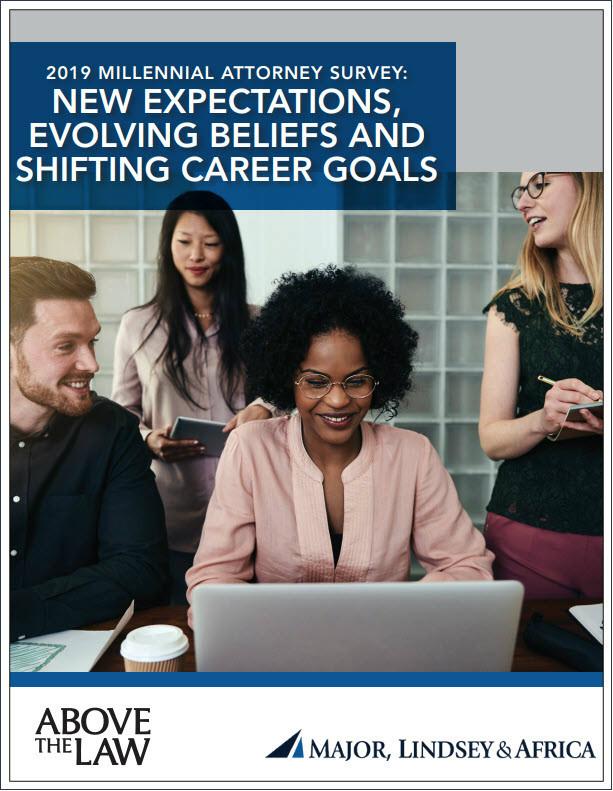 Since ATL decided to ditch the snark-infested comments section (a good thing, IMHO, since it displayed an appalling lack of civility and professionalism, which lawyers are supposed to have), I thought I would share some thoughts that readers have shared with me. Of course, the commenters’ emails to me are not anonymous, but I preserve their anonymity here.
Since ATL decided to ditch the snark-infested comments section (a good thing, IMHO, since it displayed an appalling lack of civility and professionalism, which lawyers are supposed to have), I thought I would share some thoughts that readers have shared with me. Of course, the commenters’ emails to me are not anonymous, but I preserve their anonymity here.
Some thoughts about the staggering student loan debt law students incur that I talked about recently…
One long-time practicing lawyer says that he is “…appalled at the shameless willingness of people, under the guise of ‘law school,’ to swindle the hopeless and the desperate.” Calling it “scandalous,” he says that “[o]stensibly respectable institutions open cash-cow law schools regardless of whether the market will value their graduates.” In his state, the supply of lawyers exceeds demand. I’m sure that his is not the only state.
Another reader wrote about the need for bankruptcy protection for student loan debt. He notes that “…there is a bipartisan bill in the House right now, HR 2366, that would return standard bankruptcy rights to all student loan borrowers. This should be fought hard for. It will level the playing field, force the lending side to behave at least as well as credit card companies, and will cost $3 billion a year, a tiny fraction of what is lent every year and of the $50 billion or more that the government profits on the lending system annually.”
A 3L wrote: “I think that many students either go to law school with a rosey [sic] picture of how rich they’ll become or don’t think much at all about how to pay for it.” The crisis of student loan debt and the effect it has on not just employment decisions but future life itself is now becoming a topic of scholarship.
This fall, the University of Utah Law Review held a symposium on “Financing the Future.” Here’s a link to the symposium on YouTube.
While the symposium is hours long, there are a couple of things you might want to take a look at (perhaps while filling out time sheets?): one is the presentation by Paul Campos, the University of Colorado professor, whose article in The Atlantic several years ago, prompted John Grisham’s thinking that led to his most recent book, The Rooster Bar. Another is the keynote speech by Seth Frotman, the Student Loan Ombudsman at the CFPB. Whatever your thoughts are about that agency, I doubt there can be any disagreement that the student loan debt crisis can be ignored any longer.
Some months after I wrote my requiem for Whittier Law School came an email from a graduate of Valparaiso Law School, which is winding down its operations. This lawyer was “…shocked to learn of its effective closure. It had been around in various forms since 1879. At first, I was not surprised. Then I was saddened to think of all the alumni over many years with a vested interest in the institution.”
So, we have massive student loan debt burdens, still lousy bar passage rates (at least here in California), non-elite law schools closing, and yet, there’s screaming in the land about the lack of access to justice. This is a perfect storm of problems confronting us.
Those comments bring me to Bill Henderson’s column on his Legal Evolution blog, The Decline of the PeopleLaw Sector.
What Henderson talks about is something all of us in the profession should be worrying about: the decline of the number of lawyers who represent individuals, rather than the corporate entities (e.g., organizations) who can (and often do) pay attorneys like slot machines. That’s where the money is, and that’s why lawyers chase that business.
Why not have a PeopleLaw practice? For any solo and/or small firm, the answer is not surprising: small firms and solos are under severe economic stress. Henderson cites Clio’s 2017 Legal Trends Report.
For you Biglaw peeps awaiting word about year-end bonuses, consider that the solo/small firm lawyer bills at an average hourly rate of $260. Hard to pay off student loan debt at that rate, isn’t it? Clio reports that the average solo/small firm lawyer has a little more than two (not a typo) billable hours a day.
How is the rest of the day spent? Almost half of the rest of the time is spent on administrative matters, such as billing, collections, and configuring technology. The final third of the time is spent on business development. It’s no surprise that we spend as much time foraging for business as getting the work done. I would not be at all surprised if the amount of time spent networking exceeds the return on investment.
Per Clio, the average annual gross receipts is $105,000, but let’s not forget overhead, malpractice insurance, health insurance, taxes, and so on. The net income can be and often is considerably less. Now, how do you pay off the student loan debt and live — e.g., roof over head, food on the table, having children, and so on, while providing access to justice for those who cannot afford the billing rates of Biglaw and/or don’t have a matter that needs that level of lawyering?
Henderson questions where we are going. Yes, technology is changing the face of the practice, and yes, technology is and will be taking jobs that lawyers have always had. It’s clear, Henderson says, that market forces pivot lawyers to represent organizations, rather than the “little guy.”
How many times have we said to clients that the particular matter is not worth pursuing due to litigation costs, whether as plaintiff or defendant? Henderson says that there must be a balance between representing organizations and representing the PeopleLaw sector. If we lose the latter, we are doomed to the former, and, as he says, that is not a place where lawyers and law schools should want the profession to be. How to restore that balance is the question that Henderson poses.
 Jill Switzer has been an active member of the State Bar of California for 40 years. She remembers practicing law in a kinder, gentler time. She’s had a diverse legal career, including stints as a deputy district attorney, a solo practice, and several senior in-house gigs. She now mediates full-time, which gives her the opportunity to see dinosaurs, millennials, and those in-between interact — it’s not always civil. You can reach her by email at oldladylawyer@gmail.com.
Jill Switzer has been an active member of the State Bar of California for 40 years. She remembers practicing law in a kinder, gentler time. She’s had a diverse legal career, including stints as a deputy district attorney, a solo practice, and several senior in-house gigs. She now mediates full-time, which gives her the opportunity to see dinosaurs, millennials, and those in-between interact — it’s not always civil. You can reach her by email at oldladylawyer@gmail.com.















 Get a better starting point with attorney created legal documents, checklists, guides and more. »
Get a better starting point with attorney created legal documents, checklists, guides and more. » Gain a clear strategic advantage with the fastest answers and most valuable insights. »
Gain a clear strategic advantage with the fastest answers and most valuable insights. » Simplify your matter management, client communication and financial reporting in one seamless tool. »
Simplify your matter management, client communication and financial reporting in one seamless tool. »